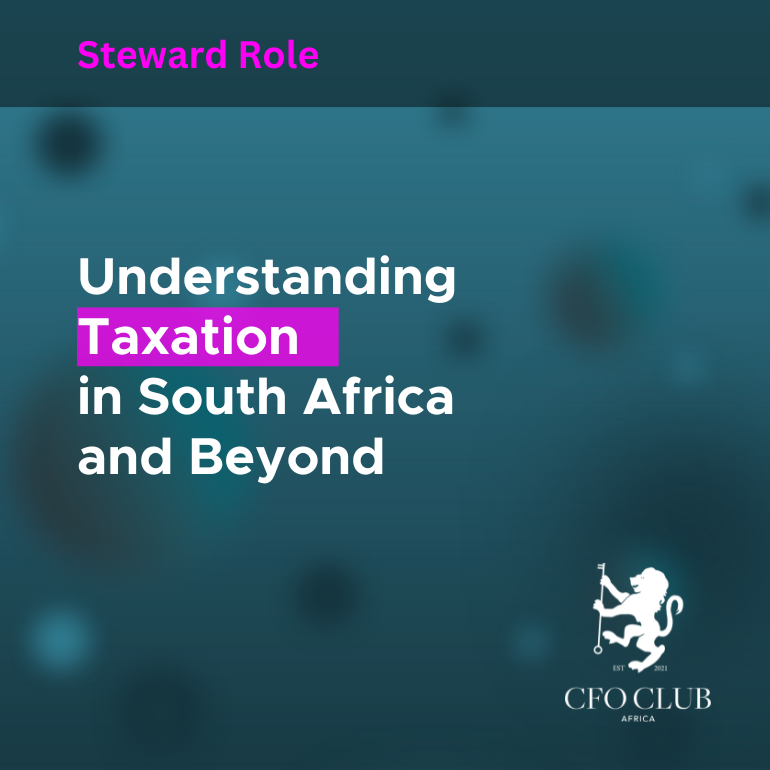Understanding Taxation in South Africa and Beyond
Navigating taxation can feel like trying to decode a foreign language, especially as a CFO responsible for staying compliant in a tax landscape that changes constantly. Taxation is about far more than just income tax; it covers a broad area of obligations with each tax type influencing financial decisions differently. This article aims to break down the fundamentals of South African taxation and offer insights into global tax trends, making it easy to understand how these taxes impact your business.
Key Tax Types in South Africa
1. Income Tax
Income tax is the cornerstone of South African tax. Both companies and individuals are taxed on their income, but the rates and rules vary. South African residents are taxed on their worldwide income, while non-residents are taxed only on income sourced from within South Africa.
- Corporate Income Tax (CIT): Currently at 27% (recently reduced from 28%), CIT is levied on profits made by businesses operating in South Africa. Tax reliefs, deductions, and incentives are available for businesses that meet certain criteria, so it’s essential to stay informed on current deductions applicable to your company.
- Personal Income Tax (PIT): Individuals are taxed at progressive rates, which can reach up to 45% for higher income brackets. However, there are rebates and tax thresholds to support lower-income earners.
2. Value Added Tax (VAT)
VAT is an indirect tax applied at 15% on the sale of goods and services. Registered businesses collect VAT from consumers on behalf of SARS and can claim VAT input credits for their own expenses. As a CFO, accurate VAT recording is crucial to avoid penalties and ensure compliance.
3. Dividends Tax
When profits are distributed as dividends to shareholders, a 20% tax applies. This tax is withheld at the time of the dividend payment and is separate from corporate income tax. Internationally, dividends are often subject to similar withholding taxes, so understanding bilateral tax agreements can help optimise withholding rates on dividends paid abroad.
4. Capital Gains Tax (CGT)
Capital gains tax is triggered when assets, such as property or shares, are sold at a profit. While part of income tax, CGT has specific rules and exclusions. For companies, the effective tax rate on capital gains is 22.4%, which may be mitigated by strategic asset management.
5. Employment Taxes
- Pay-As-You-Earn (PAYE): Collected on employees’ income, PAYE is an employer’s responsibility to remit to SARS.
- Unemployment Insurance Fund (UIF): This social security tax supports unemployed workers. Both employers and employees contribute, typically 1% of earnings each.
- Skills Development Levy (SDL): At 1% of payroll, SDL funds training programs for employees. While optional, many companies benefit from the incentives offered through training grants.
6. Transfer Pricing and Cross-Border Taxation
For companies with international operations, transfer pricing (pricing of goods and services exchanged between related entities) is essential. South African transfer pricing regulations require that cross-border transactions be conducted at arm’s length, aligning with OECD standards. Careful documentation and a clear pricing strategy can mitigate the risk of adjustments by tax authorities.
Emerging Global Tax Trends
As international tax standards evolve, especially with organisations like the OECD leading the charge, keeping an eye on global tax trends is crucial.
- Base Erosion and Profit Shifting (BEPS)
The BEPS initiative aims to prevent tax avoidance through transfer pricing manipulation and tax base shifting. South Africa has adopted many of the BEPS recommendations, including the documentation of transfer pricing and the Country-by-Country Reporting (CbCR) requirement for large multinationals. - Global Minimum Tax
Proposed by the OECD, the global minimum tax (currently at a 15% threshold) targets large multinational companies, ensuring they pay a fair share of taxes regardless of their operational jurisdiction. South Africa is not directly impacted yet, but staying informed on such changes is essential for companies with cross-border operations. - Digital Services Tax (DST)
With the rise of digital commerce, more countries are implementing a DST on companies that provide digital services to local consumers. Although South Africa does not yet have a DST, this trend is growing internationally, affecting companies like e-commerce platforms, social media, and streaming services.
Simplifying Tax Compliance
- Efficient Record-Keeping
Regularly updating tax records is essential to simplify tax filings and minimise compliance risks. Investing in accounting software that aligns with South African tax requirements can reduce errors and ensure accurate submissions. - Staying Updated with SARS Regulations
SARS frequently updates tax regulations, and keeping track of these changes can be challenging. Consider subscribing to SARS alerts, following regulatory news, or partnering with tax professionals who can provide timely insights. - Leveraging Tax Incentives
South Africa offers various tax incentives, including deductions for research and development, employment tax incentives, and incentives for companies in Special Economic Zones (SEZs). Leveraging these can reduce taxable income and improve profitability, so it’s beneficial to explore available incentives applicable to your company. - Collaborating with Global Tax Experts
For companies with international operations, partnering with global tax experts or in-house specialists ensures compliance across jurisdictions and offers insights into potential tax-saving strategies.
Final Thoughts
Understanding and managing taxes is a crucial part of a CFO’s role, impacting everything from cash flow to global expansion strategies. By staying informed on tax types, emerging trends, and compliance strategies, CFOs can manage tax obligations effectively, ensuring their companies remain compliant while taking advantage of available tax efficiencies. After all, smart tax planning can be a strategic advantage, improving your company’s financial health and positioning it for sustainable growth.

